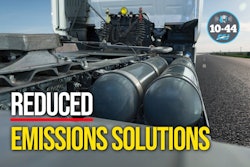CVSA’s annual Roadcheck campaign is May 13-15. The focus of this year’s campaign is hours of service for drivers, and tires on the equipment side. Both are among the leading house of service violations in their respective categories.
Contents of this video
00:00 10-44 intro
00:21 CVSA’s Roadcheck 2025 priorities
00:53 Hours of service, ELD tampering
01:38 Tire violations, Automatic tire inflation systems
03:12 Roadside inspections, education and outreach
04:06 Pre-trip and post trip inspection
05:16 Disk brakes
06:18 Three levels of truck inspection
07:16 Improving odds of passing inspection
09:33 Contesting violations, DataQs
06:18 Three levels of truck inspection
07:16 Improving odds of passing inspection
09:33 Contesting violations, DataQs
Speaker 1:
This week we're talking with CVSA about road check. What are inspectors looking for and how can you avoid being cited or parked? You're watching CCJs 10 44, a weekly episode that brings you the latest trucking industry news and updates from the editors of CJ. Don't forget to subscribe and hit the bell for notifications so you'll never miss an installment of 10 44. Hey everybody, welcome back. I'm Jason Cannon and my co-host is Matt Cole. CBS's annual road check campaign is May 13th through the 15th. That's just less than two weeks from right now.
Speaker 2:
The focus of this year's campaign is hours of service for drivers and tires on the equipment side. Each of those are among the leading violations in their respective categories.
Speaker 1:
The goal of any roadside inspection is to simply remove unsafe equipment and unsafe operators from the road. But this year's focus on hours of service violations is also honing in on cheaters.
Speaker 3:
Obviously, they're going to be looking at the records like they always do for 11 hour, 14 hour violations, all that kind of stuff. But more importantly, what they're looking for this time is false log books in particular. That was kind of the focus area. Yes, it's hours of service related, but false rods are becoming a larger issue lately with ELDs, and that's been reported by law enforcement and industry as well where they're seeing kind of an influx of tampering with ELDs. So that's really what they're focusing on. The driver's side is they're looking for those instances of tampering, misuse of things like personal conveyance and yard moves, different exemptions that are available. So that's kind of what they're focusing on. Yes, broadly it's hours of service, but it's more specifically false records of duty status,
Speaker 2:
Like hours of service, a tire violation could be any number of things. But this year's area of focus is on a particular component designed to help keep tires in top operating condition.
Speaker 3:
It is tires in general, but again, we had a reason for selecting it, and the reason in this case had to do with the prevalence of automatic tire inflation systems that we're starting to see. And they're not mandatory, they're not required to have or anything like that, but they can actually help a carrier. So if there's a tire leak that's discovered in the tread and that automatic tire inflation system is keeping up with it, it wouldn't be declared out of service because it's not an imminent hazard. If it can't keep up, then it would be out of service. It's going to go flat. So again, just, I hate to say new technology because it's been around a long time, but since it's something that maybe everybody's not accustomed to inspecting, we're trying to raise awareness of it, and that's why we selected tires. But more specifically, automatic tire inflation systems, it only serves to benefit the carrier or the driver.
So if they have it, it's not required, but if they have it, they're not going to get written up for violations of that system necessarily. But it could keep them from being put out of service if there is puncture in the tire or something like that. And one of the other things I know just from doing our own studies, we realize that inspectors are not always, they might be a little intimidated, I think by all the tubes and stuff coming out of the tire and they don't know how to check the inflation pressure. So we put out some additional training on that, showing them how to disconnect the ADAS system, put a tire gauge on it, check the tire pressure and rehook it up and all that kind of stuff. So it's again, kind of raising awareness on that component.
Speaker 1:
Road check has a couple of different areas of focus every year, but it doesn't have its own set of rules. These inspections look exactly like the hundreds of thousands of inspections that take place the other 362 days of the year.
Speaker 3:
Everybody gets intimidated by it, but I'll be honest, the states don't run out and hire an extra thousand inspectors just for this detail. It's the same people that are on the road every day of the year doing the same level one or two or three inspection that they would normally do. So there's no difference there. Honestly, the only difference is this is more focused on education and outreach. So this is an opportunity to engage with the inspectors to have some discussions with them. A lot of trucking associations join with them and let their members ride along with inspectors or watch 'em do inspections. So it's really a time to come together. It's not anything to be afraid of because the inspection is going to happen regardless. It may be a different day, but those inspectors are out there inspecting trucks every day.
Speaker 2:
It's also important to understand that inspectors will be looking for all violations, not just those in the areas of focus. The betting odds are on brakes to lead equipment out of service violations.
Speaker 3:
I think the most obvious one is your pre-trip and post-trip inspections. Yes, you're supposed to be looking at the brakes. That's part of it. And I know not everybody always crawls under their trucks or if it's snowy or rainy out, they don't want to get dirty. You get cold and stuff. And so they end up just kind of glancing under there and not maybe being as thorough as they should be on the driver's side. But I think there's other reasons too. I think sometimes carriers aren't given their drivers enough time to do a full inspection. They're not giving 'em a time and a safe location to get under that truck and actually look at it or getting the technicians under their regularly to make sure that it's in good operating order. And I think the other reason too is people rely on technology to take the place of actually getting under there and looking at it. So we have automatic slack adjusters. We've had those as a mandatory component since 1994. And I think people put confidence in that and end up not crawling under the truck. They assume that's going to handle their brakes for 'em, and it doesn't always. So there's definitely a need to get your eyes and your hands under there and check those components.
Speaker 1:
Disc brakes are becoming increasingly prevalent and they offer a number of upgraded benefits compared to drums. Now, the one thing I used to hear a lot was that drivers like disc brakes because DOT officers can inspect them. Jeremy says that's not really the case, at least not anymore.
Speaker 3:
They're still inspectable. They are harder. I mean, it's difficult as an inspector to angle yourself just right to be able to shine your light and your mirrors up in the right direction to be able to see the pads and brake linings and the pad retaining brackets and things like that. But they are visible, and inspectors do look for 'em. I'll give you, when disc brake came out, it took a while to get the word out to inspectors. So there was a period where maybe they weren't looking at 'em as closely because they didn't necessarily understand them, and now they do, and we've put out a lot of training, a lot of extra information, and so they are being inspected. But like I said, it just uses additional tools instead of being able to crawl under there and just glance at it like you do with a drum break, you probably need to have mirrors and things like that to be able to see in different angles, especially if there's dust shields. But yeah, they're looking at 'em.
Speaker 2:
Inspectors have the option to conduct three different levels of inspection, and there are several things that can influence which inspection they perform.
Speaker 3:
It could be a lot of things. Generally we request for this event, we request people to try to do level ones if it's possible, but a level one is probably the most dangerous inspection underneath the vehicle and everything. So if you don't have a safe place to do it, maybe you're on the side of the highway. We don't really want inspectors crawling under trucks there, so they're probably going to change it to a level two or a three. So a lot of it just depends on the safety in the area, what tools and access the inspectors have to a safe location, things like that. It's determined every inspector's human too, so some of them just determine it, whatever works best for them. In my case, I would start with a lower level inspection sometime when I was doing trucks, and then if I saw obvious defects, I may escalate it up to a level one because I see I hear an air leak or something like that. So it could be on a case by case basis too.
Speaker 1:
Annual inspection data shows that around three quarters of fleets and drivers are doing exactly what they need to do with regard to safety. And if you're looking to improve the odds that you make it through unscathed this year, Jeremy has some tips.
Speaker 3:
Everybody focuses on the vehicle side, but the driver portion of the inspection is just as important. So I think the two biggest issues I saw when I was still inspecting trucks were drivers just maybe didn't know where their paperwork was or know how to find certain things within their vehicle. So preparing ahead of time, making sure that your license, registration, medical card, if you have one, and it's not tied to your license, especially your annual inspection because that sometimes is a piece of paper, sometimes it's a decal that's on the truck, and drivers don't always know where to find it, and then they get written up for it even though it may have been there, they just didn't know it was there. So getting that stuff planned in advance, making sure you know where all that is will save you a lot of time on the side of the road and it'll make the process go smoother.
And it tells the inspector that you're prepared and that you take your job seriously. Right. It spoke volumes to me when I would open up that door and talk to a driver and they had all their stuff ready to go. It tells me that person takes pride in their job. Not that we couldn't find a violation maybe, but it tells me a lot about you. So I think that's important. And then still within that hours of service vein, since we're looking at false logs, if you're not sure about whether you qualify to use an exemption, don't use it until you're allowed to do so. Ask questions, maybe ask the inspector during road check to give you some guidance on personal conveyance or different topics like that. But I'm telling you, those things are confusing. Inspectors are looking for those things. So if you're not a hundred percent sure that you're doing it right, maybe don't use those exemptions until you understand better.
On the vehicle side. I know it sounds like low hanging fruit, but that pre-trip inspection is what it's all about. And I am not a fan of pinning the blame on drivers all the time for that because there are a lot of drivers that do good pre-trip inspections, but maybe their company doesn't support them and doesn't repair things that there are brought to their attention, and that's very discouraging to a driver. So we really try to get that word out, not just to drivers, but to carriers during this event that they control how their drivers are going to move forward with their pre-trip. And if they don't take 'em seriously, the drivers aren't going to take 'em seriously. So really starting at the top and working our way down is I think the most important thing there.
Speaker 2:
Carriers and drivers who feel like they were wrongly cited do have some recourse via data queue. But if you're going to contest a violation, Jeremy says, having all your documentation in order is absolutely critical.
Speaker 3:
If you believe a violation is written in error, the first thing is don't argue about it on the side of the road. That's probably not going to get you very far. Obviously, the inspector thinks they're right. You think you're right, you're probably not going to make a lot of progress there. Let it go ahead and accept the violation, take the paperwork from 'em, and then the carrier should file a data queue when you file a data queue. And if you've never done it, you would go to FMCs a's website. They have a portal and it will connect you to that state that wrote you the violation you put in there, why you don't think you deserve the violation, or why you believe it was incorrect. And my biggest recommendation, well two of them, number one, attach any supporting documents you have that will support your case.
That's huge. So look at cvsa website. At our website. We have inspection guidance. We have operational policies that tell us not to stack violations against companies and different things like that. If you see and it's supported in a policy, attach that policy to your data queue and it will help you immensely if you're trying to get that violation removed. All the documents you can provide, provide 'em upfront. And I know this should go without saying, but I handle data cues in my state for a while. Don't submit false information. If you got a violation for an hours of service violation for an 11 hour rule, for instance, don't go in and change the records and submit it to contest your case, right? That's submitting false information to the government. You could be prosecuted for that, and it doesn't help anybody. And I will tell you, inspectors generally save those records anyway on the side of the road.
So they're going to have the original in their hand when you file your data queue, and they're going to compare it to what you submit. So be honest, don't take things personally. Be professional in your data queue and support everything you can with supporting documents. That's your best chance of success. And don't give up. One other thing on that, sorry, don't give up because it's a multi-stage process, every state does it a little differently, but if you submit a data queue, generally it goes back to the initial inspector and maybe their supervisor or something. It could be different in some states, but that's generally the process. Well, the inspector that wrote it thought they were right, so you're probably not going to gain a lot that first submission, but you're welcome to resubmit it. And then generally it goes somewhere else, either to command staff or another agency or somebody else usually looks at it. And that's where you usually find your success at that point. But again, every state's a little different, but just be patient, be diligent, be professional, and you should see some luck there.
Speaker 1:
That's it for this week's 10 44. You can read more on ccj digital.com. While you're there, sign up for our newsletter and stay up to date on the latest in trucking industry news and trends. If you have any questions or feedback, please let us know in the comments below. Don't forget to subscribe and hit the bell for notifications so you can catch us again next week.










